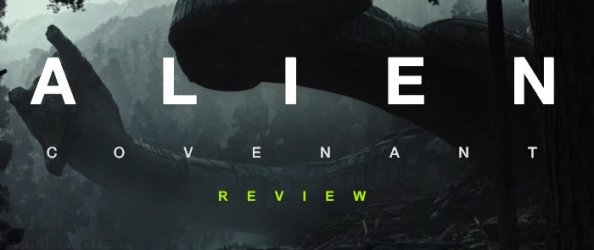
(Be warned! Spoilers ahead!)
The long-awaited Prometheus sequel/Alien prequel, Alien: Covenant is finally upon us and the expanse between the bloated, operatic, theological brain fart that was Prometheus and the claustrophobic, tightly-told seminal space horror of Alien has attempted to have been bridged by the director of both films, Ridley Scott.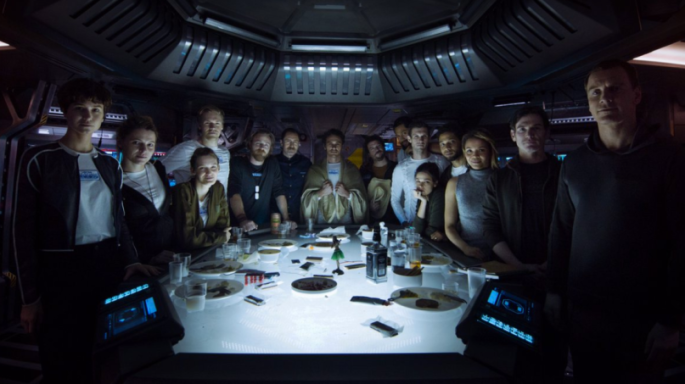 Tying these two tonally disparate films together was always going to be something of an undertaking for Scott. It’s fair to say that the original Alien has very few detractors and is generally considered to be an almost flawless piece of cinema. On the other hand, Prometheus divided fans of the series, posing questions that no one wanted asked in the first place and then singularly failing to answer any of them.
Tying these two tonally disparate films together was always going to be something of an undertaking for Scott. It’s fair to say that the original Alien has very few detractors and is generally considered to be an almost flawless piece of cinema. On the other hand, Prometheus divided fans of the series, posing questions that no one wanted asked in the first place and then singularly failing to answer any of them.
Sitting between the two films (albeit with at least one other film yet to come before the bridge is completed), Covenant is an origins story and, unlike Prometheus, poses almost no questions. Instead it attempts to answer everything; all those questions raised Prometheus (and to a lesser extent, Alien), whilst also attempting to tell an engaging narrative with a moral message. It’s a big promise to live up to.
And, by definition, that’s what a covenant is: It’s a promise. In Alien: Covenant, one can’t help but wonder what promise Ridley Scott was hoping to keep. If it was only to answer the questions posed by Prometheus, then perhaps he succeeded, but if it was to deliver a film that would bridge the gap between these two films in a way that might satisfy the fans of the Alien series, he may just have failed to keep his word.
Why? Well, whilst Covenant does give us answers, does tie together almost all the missing links (in more ways than one), it completely fails as a story that makes any kind of sense. It doesn’t help to define Alien in a context of a series of films, rather it diminishes the sheer brilliance of that first film by subtracting from its simplicity, by giving us an origin story that defines what should be indefinable: The alien xenomorph, that pseudo-sexual, biomechanical piece of nightmare fuel plucked straight from the feverish imaginings of the subconscious mind of H.R. Giger, is supposed to speak directly to our most primal fears; a sightless grey worm, birthed from male oral rape, with two mouths, steel teeth, and a human skull glimpsed momentarily through its semi-translucent carapace, is not so much from outer space as it is inner space, a product of our deepest subconscious fear and dread.

Jazz Hands
To define its origin in this way, tinkered into existence by a bored robot with “daddy issues”, is to strip the creature of all of its latent power. Arguably, this already happened in Aliens when the xenomorph became little more than a writhing mass of insectiod canon-fodder, but in the context of that film, this seemed completely acceptable. In Aliens, we had a great story, great characters, and the fact that it was Assault on Precinct 13 in space didn’t seem to matter. However, in the context of tying Prometheus to Alien, the alien absolutely needed to retain its mystery.
Some, including yours truly, suggested at the time that Prometheus was actually something of a flawed masterpiece and, interestingly, it is this notion of flawed creation, this striving for perfection and missing, which drives Alien: Covenant. From the very start – set in a sterile pre-credits two-hander between Fassbender’s David and Pearce’s Peter Weyland – we see the whole premise of the film laid thickly and whitely out, like a great big dollop of Philadelphia cheese. Let’s call this scene “David’s Motivation”, because why not spell it out entirely in the most obvious way possible in one scene, rather than tease and reveal it through action and dialogue?
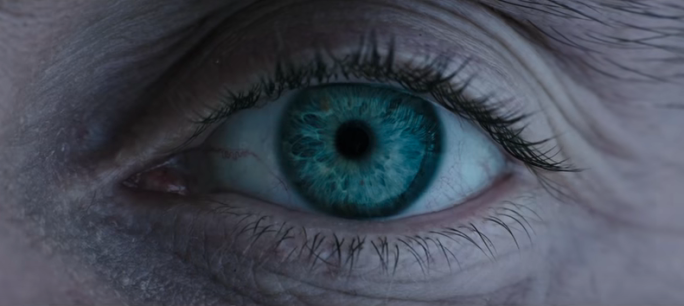
I see you. A CPU in ECU
Here, beginning on an ECU of his eye that echoes the opening of Blade Runner, David is born, sitting on his literal throne (Carlo Bugatti’s Throne chair, to be precise) into a room of great works of art, design, and purpose. Before he’s even taken his very first steps in the world (“ambulate!”), he has made the connection between Piero della Francesca’s Nativity and his own creation. He takes his name from Michelangelo’s David (incidentally, the inspiration for Prometheus’ Engineers, along with the works of William Blake), and then sits at a Steinway to play a little Wagner. His choice? “Entry of the Gods into Valhalla” from Das Rheingold. Amongst all of this heavy-handed pretention, supposedly weighty but actually rather clunky dialogue is exchanged pertaining to the meaning of life, immortality, and the nature of creation. It is here that David begins his unhealthy relationship with his “father”, his resentment towards humanity, and the idea that there may well be a hierarchy in this creation business.

Should have poured his own damn tea
Ultimately, it’s clear from this scene that David may not be the masterpiece he’s intended to be as, still less than ten minutes old, he’s already built up a resentment towards Weyland (and, by proxy, mankind itself) and revealed a sense of self-importance that will have rather dire consequences for humanity and its creators. This is why we have incept dates, folks!
Thankfully, with “David’s Motivation” scene put to bed, we now roll on to more familiar territory, with a title and visuals that directly reference the original film’s. It feels like we’re on safe ground as we revisit tropes that Scott himself helped to define. But this is, in a way, a problem in itself. On the one hand we have Ridley Scott doing another Alien movie! Look, the space trucker crew are huddled around a table! This is great!
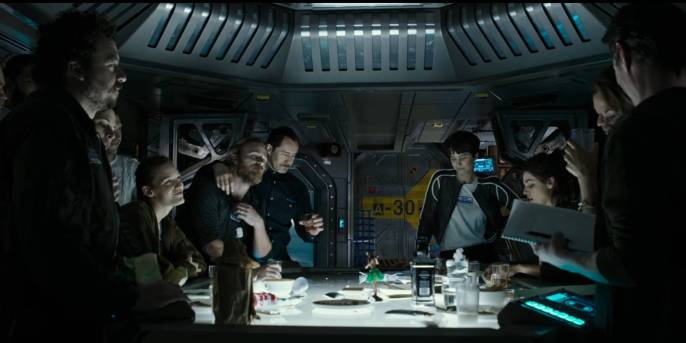
Literally never seen a shot like this before
But this also seems rather pointless in a sense, because it’s simply repetition of something he did nearly forty years ago. And, without being unkind, he did it better then. Then, it seemed naturalistic and innovative in the sense that these people felt like they belonged there, their sense of wonder replaced by weariness and the interstellar equivalent of jet lag. They talked of wanting to get home, their need for decent food and an equitable pay deal. We’d never seen that before. But the problem is that we have now. Lots. And in Covenant you get the sneaking suspicion that the actors are squealing with delight at finding themselves doing what Weaver and Co. did decades ago, but this time with far more exposition and stilted dialogue, which, when contrasted with Alien, is tantamount to breaking the fourth wall.
Indeed, Covenant breaks that forth wall quite a bit, and not deliberately, either, it would seem. The first major instance of this is having James Franco play the ill-fated captain. Granted, this is little more than a cameo, but his presence here seems like something that was a part of Danny McBride’s contract demands and when Franco appears in a video message (the modern day equivalent of the lazy flashback) in a scene that’s supposed to be highly emotionally charged, it takes us out of the moment. Even his death becomes a call-back to the four-minute teaser prologue that was released prior to the opening of the film, in which he says: “I’m burning up”. Apparently, cross-medium immolation jokes are part of Ridley Scott’s comedy tight five.
It’s enough to say that this is all familiar territory but just done with a great deal less panache than four decades ago. The beats are very similar here to Alien, as well. But here’s a vital difference: Nobody in Alien wanted to do the dumb stuff they ended up doing. They were forced into doing it. In Alien, the Weylan* Yutani Corp. has already sent them where they don’t want to be and they discover that they are contractually obligated to investigate the mysterious signal that the Company already knows is a terrifying warning to stay away at all costs. However, for the crew of the Narcissus, it’s a case of “don’t go, don’t get paid”. There’s a motivator for you. But in Covenant the mysterious signal is completely randomly discovered.

Speed dating in the future is still awkward
The whole sequence of events that follows is entirely built on this single coincidence that, in the vast cosmos they’re negotiating, seems entirely implausible. And do they proceed with the colonisation mission they all trained years for and invested their very futures in? Do they keep the crew and colonial embryos safe, or do they go to a planet they somehow entirely missed from their stellar cartography of the region? Of course, they decide to go Planet Hell Paradise.
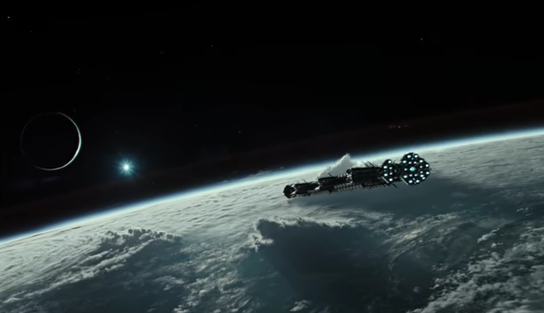
Throw me a bone
Paradise seems nice enough from fifty million kilometres away but, once again, an easy surface landing seems almost impossible in the Alien franchise. However, touchdown and we do and almost immediately people are off doing stupid shit.
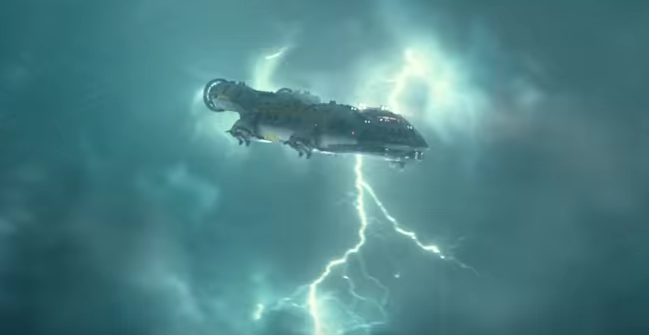
“Y’know, we could wait a couple of hours for the storm to pass or…” “Land NOW!”
In Alien there was basically one crewmember that was leading the charge for stupidity and that was John Hurt’s Kane. Kane suffered only from being incurably excitable and adventurous, but he was on an alien planet discovering new life, after all. But even he did it in a space suit. I don’t care how breathable that atmosphere is, you need to go in with at least a hankie over your mouth. Because, guess what happens when you don’t? You go for a quick fag and you get alien goo in yer ear.
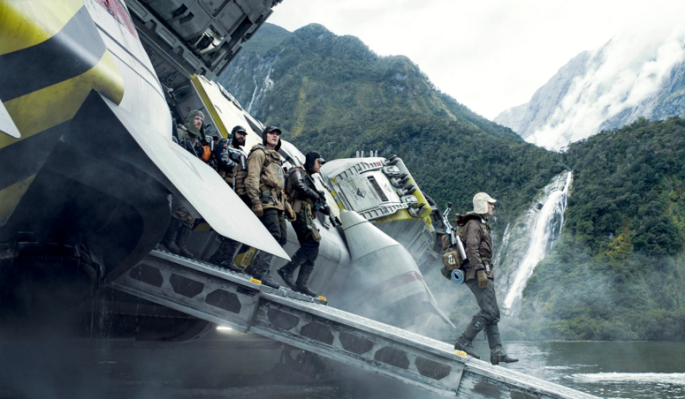
Take a lungful of that crisp, clean, alien air
What follows is a testament to poor planning and abject stupidity. Two crewmembers are infected and (in perhaps the most gruesome of all sequences in any Alien film) mere moments later (that defy all logic of a gestation period) birth two rather nasty alien critters, apparently called neomorphs. It should be said that, in Alien, we got to know Kane before his demise. We cared about him. So, whilst these deaths are harrowing, it’s hard to care about that guy in the background we know nothing about. I couldn’t tell you this character’s name without looking it up on IMDb.

Were you injured in an accident at work that wasn’t your fault?
Suddenly stranded with their only means of escape a ball of flame, the surviving members of the crew can only huddle in the corn (corn!) and point their decidedly present-day firepower into the darkness. This is perhaps as tense as the film gets, but even this feels like something lifted directly from a Jurassic Park sequel.
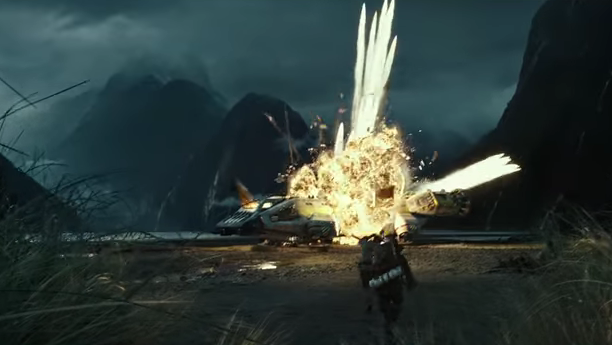
Not sure their insurance will cover this
Having said all of this, the first act is still the best thing about the whole film. With the arrival of David (all lank hair and monk robes) we embark on the next sixty minutes of Act Two, and the promise and possibility of Act One is discarded in favour of a weary Frankenstein/Doctor Moreau parable in a series of sets that look like they are leftovers from an episode of the original Star Trek series.
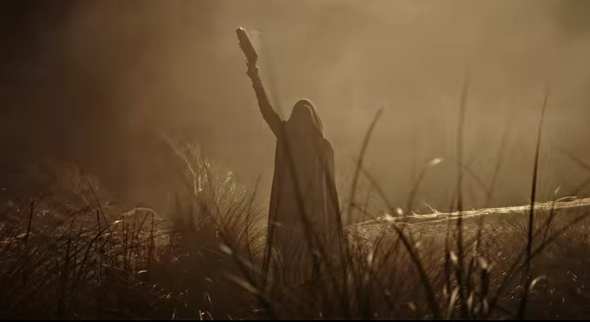
The saving of all this (if it can be called saving) is Fassbender’s dual performance of both David – the android with a (micro)chip on his shoulder – and Walter, the “improved” model who has been programmed without the ability to think creatively. Walter explains that this was because David was “too human” and that it unsettled his genuinely human counterparts, but I think that it’s fair to say what was unnerving about David wasn’t due to the uncanny valley, rather more that he was so inhuman and so inhumane. Walter, by comparison, seems far more human, and his lack of creativity does not stop him from learning or experimenting or being inquisitive. Despite his egregious American accent, Walter is far the more likable of the two. However, he is present as a foil to David to highlight just how dangerous his older sibling has become.
From the moment the two “brothers” meet and David gets out the shears, its fairly evident what is going to transpire. The set up for the “most obvious twist in cinematm” happens about five minutes into the second act and that’s a long way to telegraph a trope so hackneyed that you almost can’t quite believe that a director of Scott’s calibre is going to attempt it. If he’s going to do a Spot The Imposter, he’ll subvert it, surely? Spoiler alert: He doesn’t.
This ridiculous plot device is just about annoying enough to make you ignore the fact that the handful of survivors are intent on nipping off on their own, despite finding themselves in a citadel surrounded by literally thousands of semi-melted humanoids. Even David’s assurance that they are “perfectly safe” should not be enough to make them wander off on their own, but wander off they do, with predictable consequences.
For example, even when confronted by David attempting to communicate (an unintentionally laugh-out-loud moment) with one of the neomorphs in front of the decapitated remains of his fellow crewmember, Billy Crudup’s Oram does not seem too concerned that David might not be trusted. In fact, he wanders off with him, the lamb following the wolf, to a room full of alien eggs. Now, admittedly, Oram would have no notion of what these eggs might contain, but he’s just seen bits of his friend floating around in a puddle and had to shoot something that would give Francis Bacon bad dreams.
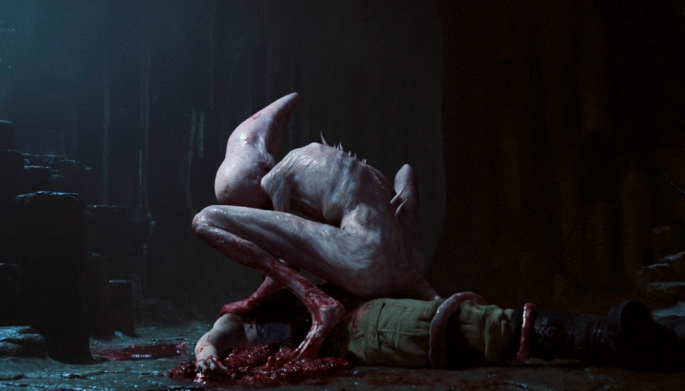
Om, nom-nom
So, why not stick your face in that egg? Remember, these people were going to colonise a planet – with common sense this low on the scale, one suspects they wouldn’t have made it to the second generation.

How you like your eggs? Over easy?
During this time, David and Walter bond and quote poetry to one another. David, looking out over the remnants of the Engineer’s ruined city quotes Ozymandias: “Look on my works, ye mighty, and despair…” and this is, one assumes, a way to give this film some kind of intellectual weight that it doesn’t really deserve. Yes, the Engineers’ civilisation has ultimately crumbled to nothing, so the quote is pertinent, but it does feel somewhat shoehorned in and feels ultimately hollow and pretentious.
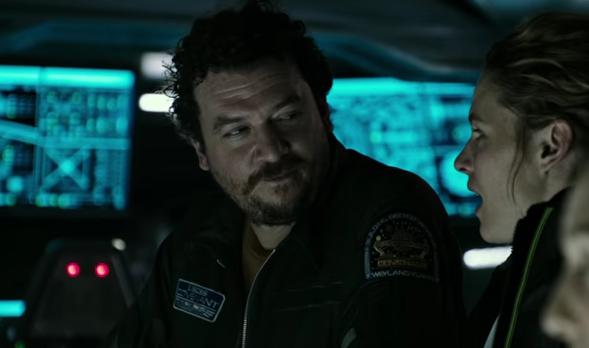
Take the ship eastbound, and down
Meanwhile, up on the main ship, Danny McBride’s Tennessee is out-acting everyone. Yup, that Danny McBride. How Danny McBride gets to be the best thing in this movie is quite possibly the biggest mystery of the whole Alien franchise, but even with twice the Fassbender to compete with, he manages it. What’s bizarre is that his decision to take the Covenant into a low orbit that might see the whole ship, its remaining crew, and its cargo of colonists obliterated, seems like a pretty sensible one in comparison to the decisions made by nearly everyone else in the film.
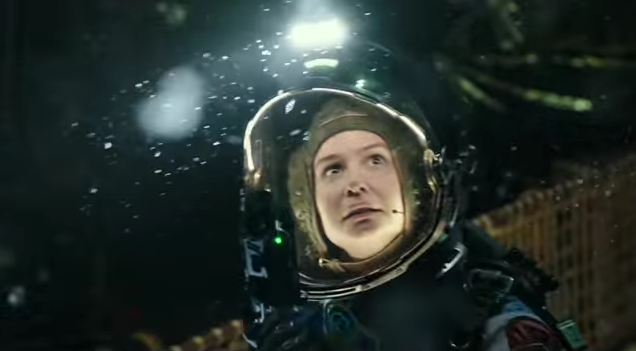
*Not Ripley
The only other sensible person is the film’s default female protagonist, the Ripley-lite Daniels (Katherine Waterston), who is the only one who seems really intent on leaving as soon as possible. Her whole character seems to be based around the notion that “this is a bad idea” and, of course, she’s not wrong.
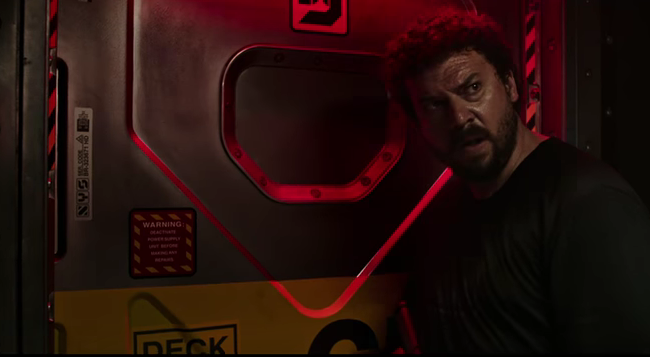 Both Daniels and Tennessee suffer the loss of their partners, which makes them kindred spirits of sorts, but they both recover from this news remarkably well. Daniels does seem shell-shocked and Tennessee steps outside for about thirty seconds, but is fine afterwards. Admittedly, they do have the pressing issue of staying alive themselves to contend with, so perhaps this is forgivable.
Both Daniels and Tennessee suffer the loss of their partners, which makes them kindred spirits of sorts, but they both recover from this news remarkably well. Daniels does seem shell-shocked and Tennessee steps outside for about thirty seconds, but is fine afterwards. Admittedly, they do have the pressing issue of staying alive themselves to contend with, so perhaps this is forgivable.
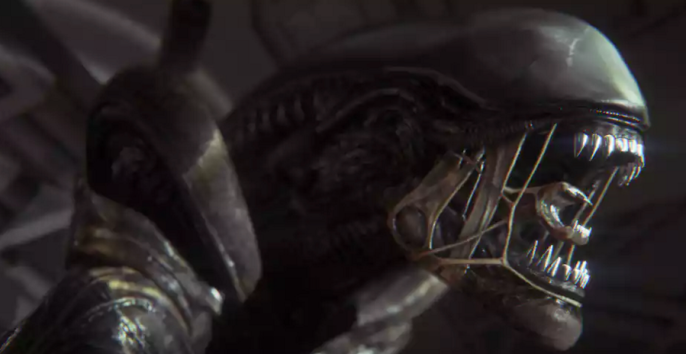
Don’t forget to explain me!
Is that the time? We’re rolling on to the close of Act Two, so we’ve only got about five minutes to deal with the origins of the xenomoprh. Damn, knew there was something. Better hastily shoe-in some backstory about how David has been tinkering with the black goo DNA he kept over from Prometheus and has, in what looks like a papier-mâché cave, managed to create all sorts of biological hybrids that will form the bridge to the “ultimate lifeform” we know so well. How he’s done this exactly, we’ll never know, but there were loads of charcoal sketches of facehuggers n’ stuff about the place, so we better just assume he was able to do this over the last ten years of his isolation. There doesn’t seem to be anything like the facilities to do this on the planet, but let’s just say he’s done it, because to examine this too closely would mean that the whole Alien series, the whole mythos, would be based on a very hastily put together bit of retconning that has been handwaved over with some Applied Phlebotinum. Tropes. Learn them.
So, with the origins of the xenomorph now explained to us (the butler did it!) we can now get on with the business of the Third Act. If you’ve read this far, good to still have you on board. In this last act we will get to have the payoff of finally seeing the xenomorph adult doing its thing (and by “its thing” I mean emerging from shadowy spaces, pouring itself down corridors, and eviscerating hapless crewmembers) and we’ll also get that twist we haven’t seen coming for the last hour or so.
Walter inevitably confronts David and explains that his misattributing Ozymandias to Byron as opposed to Shelly means that his foundation for perfection is ultimately flawed. This harks back to the idea of flawed masterpieces that was set up in the prologue and should, if David really thought about it, make him realise that his striving to overthrow the imperfections of humanity is ultimately futile. But David doesn’t miss a beat. No-one wants to admit the last ten years was for nothing, trust me.
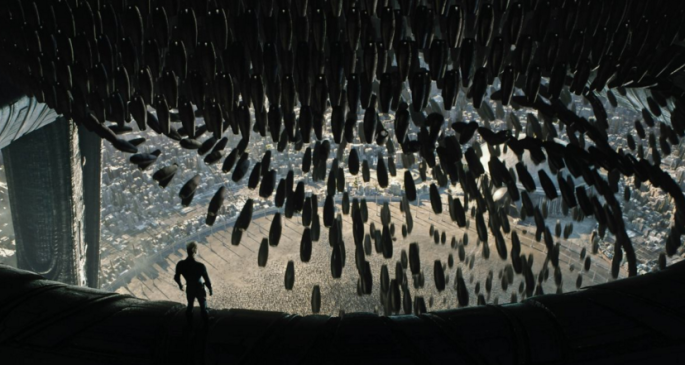
He’s nervous, but on the surface he looks calm and ready…to drop bombs
Walter tells David he knows his intentions and in a fit of cliché says: “you know I can’t let you leave here”. It’s really the one thing you should never say to the evil bad guy who has taken you into their confidence as a means of exposition, but he says it anyway, thus precipitating the inevitable physical confrontation between the two. David kills Walter in a loving embrace (it’s like they had a hat full of clichés and just wanted to literally see how many they could cram into 123 minutes). This gives David enough time to go off and reveal himself as the Big Bad to Daniels, who has at this point discovered Shaw’s body (up until this point, Shaw has been somewhat canonised by David, even going as far to “bury” her out in his garden, so the reveal he has used her in [some unspecified way] for his experiments is supposed to be something of a shock. Perhaps not telegraphed as obviously as some of the other twists, but if you didn’t see this coming, you were clearly looking the wrong way). Shaw, you’ll remember, is the protagonist from Prometheus, played by Noomi Rapace. Rapace may have been unavailable, or perhaps she declined to appear in the film, but if she was written out, it is a shame. It feels a little like the demise of Hicks and Newt in Alien3. A little insulting to the audience who invested time with that character, only to have their demise happen off-screen. One hopes she got a good payday for her likeness being used, at least. Bet she’s sippin’ a cool Margarita somewhere on that coin.
Anyway, anti-surprise! Walter didn’t die and is able to throw David clear to enable Daniels to escape with Tennessee on his space crane. I don’t know what else to call it. It’s actually a rather satisfying to watch Fassbender fighting Fassbender, but we know this is all just leading up to the twist that should never have been. Yup, here’s Walter with the upper hand, stalling just long enough to give David a chance to grasp for that blade. What? They cut away? How on earth will we know which one of them made it? How? By having a human brain, that’s how. Every single member of the audience knows exactly which one of them made it out of there and literally no one on the planet above the age of three will be surprised to learn that David kills Walter and replaces him in order to get himself off this hell hole. I know this is spelling out a fairly major plot point, but this is one of those moments when a spoiler isn’t actually a spoiler.

Crane of Fools
What follows in the next ten minutes is what might happen if Michael Bay got the chance to direct an Alien film. I can almost not bring myself to talk about it, but I’ve come this far and so have you. So, we have Tennessee, Daniels, “Walter”, and Sgt. Lope on the spaceship equivalent of a flatbed truck with a crane stuck on it. (I know I haven’t mentioned Lope yet, but suffice to say, of the four of them, Lope isn’t what you’d call principal cast. He’s lucky he’s made it this far and frankly we shouldn’t expect him to last). On to this floating platform jumps our newly adult xenomorph, courtesy of Oram’s naïve curiosity.
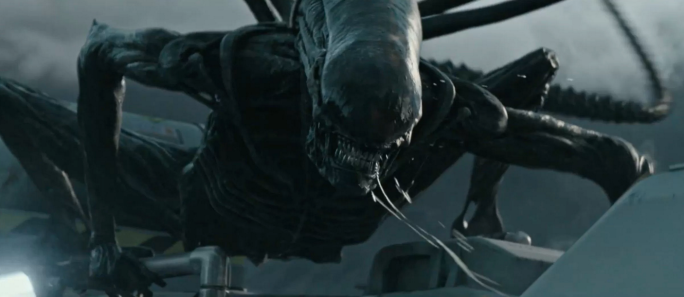
Oh, hai!
However, it possesses none of the finesse, none of the balletic poetry of movement that it will later display in Alien. Instead it is essentially a velociraptor in an obviously CGI alien skin. But that’s okay because if it displayed a tenth of the animalistic intelligence it displayed in Alien, it wouldn’t helpfully rush headlong into the claws of a mechanical crane and die in under ten minutes. Honestly, this thing is supposed to be the perfect lifeform.
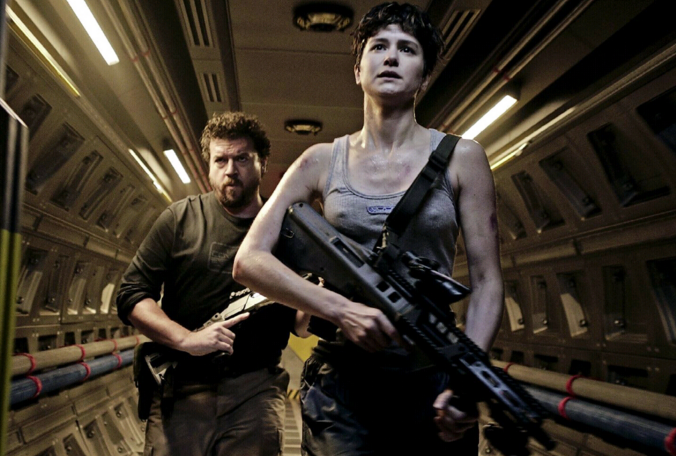
It’s cold in space, apparently
Anyway, now back aboard the Covenant, Lope, the victim of a facehugger who had the alien equivalent of premature ejaculation, gives birth to a second xenomorph (they’re just cranking them out now) and this gives Scott the opportunity to cram in to the final twenty minutes an abridged version of his original film. Literally, everything significant thing that happens in Alien also happens in the final act.
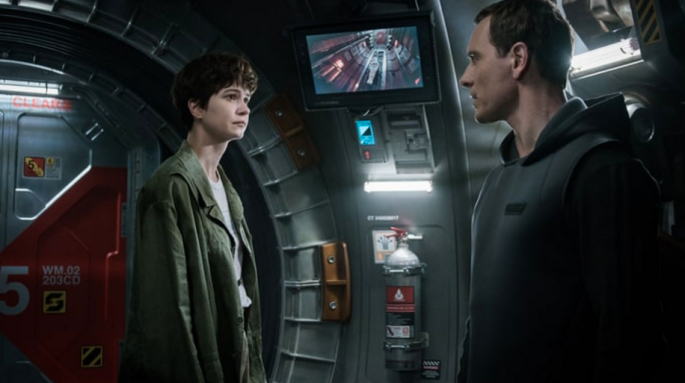 Finally, with the xenomorph airlocked, we can all relax. But wait! Just as our two survivors are being ensconced into hypersleep, we get the reveal that “Walter” is, in fact, David (!) and that he intends to continue his nefarious experiments and his pledge to overthrow humanity. The message here is that Scott is clever because he knows his Byron from his Shelly, but you, his audience, are all dumb f**ks, stupid enough to fall for a trope that’s been used in sci-fi since the beginning of forever. If that sounds insulting, it’s because it is.
Finally, with the xenomorph airlocked, we can all relax. But wait! Just as our two survivors are being ensconced into hypersleep, we get the reveal that “Walter” is, in fact, David (!) and that he intends to continue his nefarious experiments and his pledge to overthrow humanity. The message here is that Scott is clever because he knows his Byron from his Shelly, but you, his audience, are all dumb f**ks, stupid enough to fall for a trope that’s been used in sci-fi since the beginning of forever. If that sounds insulting, it’s because it is.
Watching Alien: Covenant for the first time, one gets the distinct impression that Scott was apologising for Prometheus, but as an apology, it is somewhat of a backhander. Visually stunning, yes. It’s Ridley Scott and he does visually stunning before his first cup of tea. Coherent? Thought provoking? Actually any good? Well, I’ll let you be the judge of that. But I will say that, as a life long Alien fan, Covenant succeeds only in diminishing Alien by attempting to demystify it. Some things are better left unexplained and some dreams better off uninterpreted. The alien is our cinematic nightmare, and to paraphrase Yeats, “I have spread my nightmares under your feet; tread softly because you tread on my nightmares.” In which case, perhaps Scott might have proceeded with a slightly lighter step.
Dublo
Suzie Marciano
May 17, 2017
That was a long review, but probably the best review of any movie I’ve ever read!!!!!